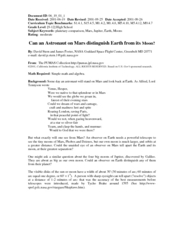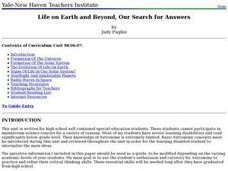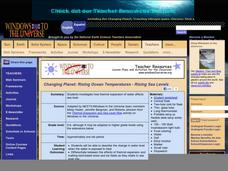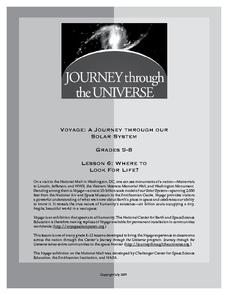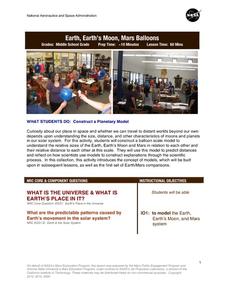Curated OER
Earth Book
After viewing a teacher-led demonstration on a variety of landforms of the Earth, 1st graders create an Earth book. This nicely-done hands-on lesson has students produce books that describe, in pictures and words, different aspects of...
Curated OER
Digging the Earth's Crust
Students investigate the Earth's crust. In this geology lesson, students identify the materials made up of the Earth's crust and investigate the different kinds of soil.
Curated OER
Can an Astronaut on Mars Distinguish Earth from its Moon?
High schoolers explore the possibility of being on Mars and being able to identify the Earth. In this space lesson students complete a set of calculations to see if this is possible.
Curated OER
Earth Day
Students practice addition and estimation. They use tens models to solve the problems related to grocery bags and Earth Day. Afterwards, they complete an activity sheet and draw a large grocery bag decorated with Earth Day messages.
Curated OER
Life on Earth and Beyond, Our Search for Answers
Students in a special education classroom are introduced to how the universe and solar system was formed. Using the internet, they research the characteristics of Earth that support human life. In groups, they compare and contrast...
Curated OER
Models of the Earth and Moon
Students explore the earth's rotation and phases of the moon. In this planets lesson plan, students rotate and revolve around a light representing the sun. Students use movement and props to simulate what causes the phases of the moon as...
California Academy of Science
Kinesthetic Astronomy: Mars Opposition Dance
Your class will watch as one child orbits the sun as Earth, while another orbits as Mars. If the timing is right, they will see the repetitive dance between the two planets and discover how often they are opposite from each other. For...
Curated OER
Changing Planet: Black Carbon - a Dusty Situation
Introduce your young meteorologists to black carbon produced by the burning of fossil fuels by showing the video, "Changing Planet: Black Carbon." Viewers discover that deposition of this carbon on polar ice impacts the absorption of...
Curated OER
Changing Planet: Rising Ocean Temperatures - Rising Sea Levels
As an anticipatory set, young environmental technicians watch a video about how ocean temperatures seem to be changing along with the global climate. They perform a laboratory demonstration with the purpose of observing what happens to...
Curated OER
Distance to the Moon
Students predict and determine the distance between the Earth and the moon. In this investigative lesson students participate in an activity that helps them to determine the distance from the earth to the moon.
University of Colorado
Clay Planets
Why do scientists use models? In the first installment of 22, groups create scale models of our solar system. They then share and discuss their models.
Curated OER
Earth's Water
If the majority of our planet is covered with water, why do we need to bother conserving it? With a thorough and varied investigation into the location and types of water on the earth, learners will gain an understanding of why this...
Curated OER
Space: Stars and Planets
Students observe and report that the moon can be seen sometimes at night and sometimes during the day. They describe how changes to a model can help predict how the real thing can be altered. Students explain the essential fact of the...
Curated OER
What's "In" There: A Study of the Inner Planets - Mercury, Venus, Earth, and Mars
First graders identify and explore the four inner planets. In this planet science lesson, 1st graders watch a PowerPoint about the planets. Students read the book Our Solar System and discuss the inner planets. Students create a book...
Journey Through the Universe
Where to Look For Life?
Every year we discover new planets including more than 1,000 in 2016 alone. Will we ever find life on another planet? The instructional activity includes two activities to help scholars understand this concept. First, they analyze the...
Baylor College
Modeling Earth's Atmosphere
Life on Earth is made possible by the unique composition of its atmosphere. Working collaboratively, a scale model is created as young scientists learn about the different layers of gas that surround the planet. Cards are included that...
PricewaterhouseCoopers
Waste and Recycling: Recycling and Energy Recovery
Reduce, reuse, recycle, and recover. Young environmentalists learn about the overwhelming amount of garbage produced and discover better ways to minimize their impact on Earth by learning the difference between garbage and...
Curated OER
Terrabagga Activity Using a Magnetometer
Clever! Earth science learners construct a model of a planet containing a magnetic core. The planet, Terrabagga, is made out of a paper grocery bag, magnets, a dead D battery, and rubber bands. Pictures of each step of the construction...
Curated OER
Our Intriguing Star, the Sun!
Explore the sun in a lesson plan about space. The lesson spans ten weeks, with students performing activities to answer weekly questions about the Sun and Earth.
Curated OER
Reading and Writing about the Solar System
A superb interdisciplinary approach highlights this lesson which incorporates space science knowledge and narrative skills. After reading The Magic School Bus, two excellent poems, and watching a video, all about our solar system, young...
Curated OER
My Angle on Cooling
Students explore how the angle and distance of an object can change it's temperature. After reviewing how the position of the Earth affects the temperature of the planet, student groups design and perform an experiment to test how...
Curated OER
Making Models of the Solar System
Students make several models of the solar system to learn the positions of the planets in the solar system as well as relative distances and sizes. Creation of these models will help them identify the planets by size, shape, color,...
Curated OER
Scale Model of the Solar System
Young scientists gain a better understanding of space, the solar system and its vastness by creating a scale model. Students first need to calculate the distance between each of the nine planets according to the size of their scale. This...
NASA
Earth, Earth’s Moon, Mars Balloons
Very specific diameters are given for blowing up three different balloons to represent, in scale, the moon, Earth, and Mars. In groups of three, amateur astronomers explore scale measurements and distance in space.




